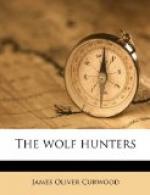Meanwhile two children came to bless the happy union of Newsome and his lovely Indian wife. One of these, the eldest, was a boy, and in honor of the old chief he was named Wabigoon, and called Wabi for short. The other was a girl, three years younger, and Newsome insisted that she be called Minnetaki. Curiously enough, the blood of Wabi ran almost pure to his Indian forefathers, while Minnetaki, as she became older, developed less of the wild beauty of her mother and more of the softer loveliness of the white race, her wealth of soft, jet black hair and her great dark eyes contrasting with the lighter skin of her father’s blood. Wabi, on the other hand, was an Indian in appearance from his moccasins to the crown of his head, swarthy, sinewy, as agile as a lynx, and with every instinct in him crying for the life of the wild. Yet born in him was a Caucasian shrewdness and intelligence that reached beyond the factor himself.
One of Newsome’s chief pleasures in life had been the educating of his woodland bride, and it was the ambition of both that the little Minnetaki and her brother be reared in the ways of white children. Consequently both mother and father began their education at the Post; they were sent to the factor’s school and two winters were passed in Port Arthur that they might have the advantage of thoroughly equipped schools. The children proved themselves unusually bright pupils, and by the time Wabi was sixteen and Minnetaki twelve one would not have known from their manner of speech that Indian blood ran in their veins. Yet both, by the common desire of their parents, were familiar with the life of the Indian and could talk fluently the tongue of their mother’s people.
It was at about this time in their lives that the Woongas became especially daring in their depredations. These outlaws no longer pretended to earn their livelihood by honest means, but preyed upon trappers and other Indians without discrimination, robbing and killing whenever safe opportunities offered themselves. The hatred for the people of Wabinosh House became hereditary, and the Woonga children grew up with it in their hearts. The real cause of the feud had been forgotten by many, though not by Woonga himself. At last so daring did he become that the provincial government placed a price upon his head and upon those of a number of his most notorious followers. For a time the outlaws were driven from the country, but the bloodthirsty chief himself could not be captured.
When Wabi was seventeen years of age it was decided that he should be sent to some big school in the States for a year. Against this plan the young Indian—nearly all people regarded him as an Indian, and Wabi was proud of the fact—fought with all of the arguments at his command. He loved the wilds with the passion of his mother’s race. His nature revolted at the thoughts of a great city with its crowded streets, its noise, and bustle, and dirt. It was then that Minnetaki pleaded with him, begged him to go for just one year, and to come back and tell her of all he had seen and teach her what he had learned. Wabi loved his beautiful little sister beyond anything else on earth, and it was she more than his parents who finally induced him to go.




